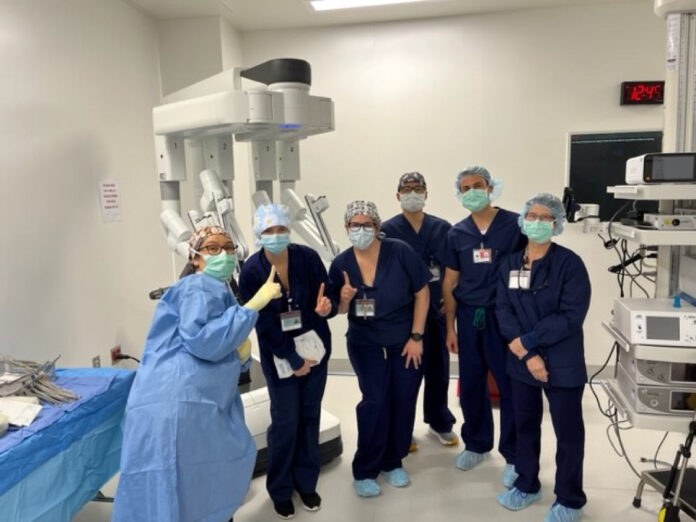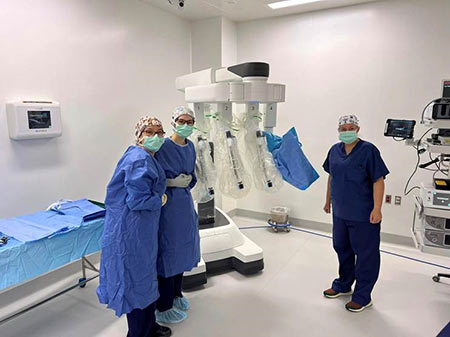
Drs. Jacob Calvert and Leslie Disher were among the first Vancouver Clinic surgeons to use the da Vinci Robotic Surgical system for hernia and hysterectomy surgeries last month. The da Vinci system, which was installed as part of the Salmon Creek 2 expansion project, allows surgeons to use very small tools and access difficult-to-reach areas of the body without a large incision. The technique can be used for gallbladder, hernia, reproductive organ, colon, kidney and bladder surgeries.
These surgeries were the first-ever robotic hernia and hysterectomy procedures in a standalone ambulatory surgery center in the greater Pacific Northwest (Washington, Oregon, Idaho, Alaska and Northern California).
“Traditionally, many hysterectomies have required an abdominal incision to be performed as an open surgery,” Dr. Calvert said, when addressing the benefits of robotic surgery. “Robotic surgery has allowed us to convert almost all of these open surgery hysterectomies to minimally invasive surgeries. Out of the hundreds of robotic hysterectomies I have done, I can count on one hand the number of times that I had to perform an open abdominal hysterectomy. Patients who in the past would have spent three days in the hospital can now have the same surgery performed at an outpatient surgery center and go home a few hours after their surgery.”

Calvert said that the recovery time decreases from six weeks down to usually one week with the robotic hysterectomy surgery. Patients are able to get back to normal activities very quickly and he said most patients take two weeks off of work. When comparing an open hysterectomy to a minimally invasive robotic hysterectomy, Calvert said the risks go down significantly with a minimally invasive approach.
“There is a significantly lower risk of pain, bleeding and infection,” he said. “This really is better surgery with lower risks. The key question is always, ‘what is best for our patients.’”
“This technology is exciting for us to be able to share with our patients at Vancouver Clinic,” Dr. Disher said, in a Vancouver Clinic news release. “A wide variety of surgeries – including inguinal hernias, umbilical and ventral hernias, and cholecystectomies – can be performed in our surgery center now that we have the robotic platform. All of these robotic surgeries would have been done at the hospital before now.”
“We are starting with the most common procedures using the da Vinci,” said Jeff Love, director of Ambulatory Surgery Services at Vancouver Clinic. “There are additional gynecologic, urologic and general surgery procedures that can be performed with the da Vinci. We may also remind folks of the MAKO robot, which we have been using since 2019 specifically for total knees and hips.”
In regards to staffing, use of the da Vinic system requires one additional person in the Operating Room, a surgery technician. Kelly Love, marketing director for Vancouver Clinic, said that their contract negotiations with the vendor prohibit them from disclosing the finances involved with the da Vinci system. She said “both the vendor and Vancouver Clinic are excited to bring da Vinci to a stand-alone ambulatory surgery center – first in the Northwest – improving quality for the patient and lowering costs.”
Mark Mantei, Vancouver Clinic CEO, said that new technology that improves patient experience is always attractive to recruiting surgeons.
“Prospective staff and clinicians also consider the overall services and programs of the organization as a whole,” Mantei said. “Vancouver Clinic has been growing its services from primary to urgent to specialty care, laboratory and surgical care to offer the full complement of medical expertise. It is the comprehensive network of care that is appealing to staff and surgeons. Rather than a piece meal approach, we have excellent continuity of care.”
Vancouver Clinic now offers the two robotic-assisted surgical systems for outpatient procedures – the da Vinci and the MAKO.
“We want what’s best for patients,” Jeff Love said. “Robotics are a tool the surgeon can use – the surgeon is always guiding the robotic arm and then determining how to use it – always in control of every decision, every action, every pinpoint moment.”
Physicians from specialties throughout Vancouver Clinic can schedule patients into the surgery center to help ensure fast access to high-quality, low-cost surgical care. The new Vancouver Clinic Surgery Center is open for limited procedures at this time and will be fully open in May 2023.





